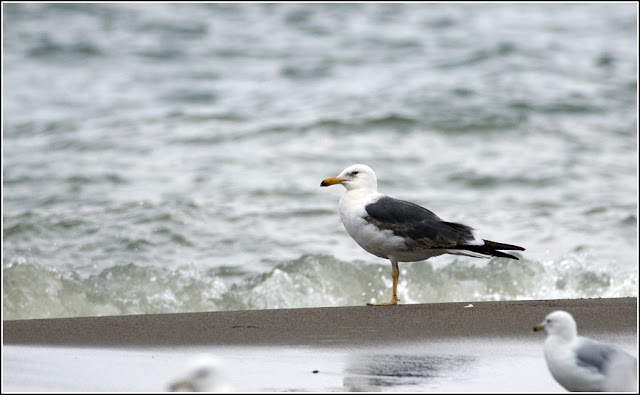While we were walking, I kept an eye on the various flocks of gulls. One flock contained this Lesser Black-backed Gull which is either a 2nd cycle or 3rd cycle.
 |
| Lesser Black-backed Gull - July 1, 2013 |
 |
| Lesser Black-backed Gull - July 1, 2013 |
Turtles were nowhere to be seen but luckily a few snakes were oot and aboot. I stumbled upon a 750 gram Eastern Foxsnake out cruising around (it was pushing 5 feet in length). I must admit it was pretty exciting seeing it stretched out in the dunes. This was the best photo I could manage as he didn't want to sit still for long.
 |
| Eastern Foxsnake - July 1, 2013 |
The first few autumn migrants, 2 Lesser Yellowlegs and a Least Sandpiper, were along the water's edge. Now that fall migrants are showing up and the days are getting shorter, it is only a matter of time until the snow is flying!
 |
| Lesser Yellowlegs - July 1, 2013 |
Around mid afternoon we finally came across a turtle on the beach to lay her eggs. She was a massive Common Map Turtle, and she had a scar from what appears to be a boat propeler. It looks to be a fairly recent injury, though it was healing. She ended up being the only turtle of the day.
 |
| Common Map Turtle - July 1, 2013 |
Map turtles in general show strong sexual dimorphism, with the females being significantly larger than the males. In Common Map Turtles, adult females top out at 11 inches in carapace length, while males top out at around 6 inches. Females have large powerful jaws; perfect for crushing molluscs and crayfish. Males on the other hand usually consume aquatic insects and smaller crustaceans.
 |
| Common Map Turtle - July 1, 2013 |
It was a pretty successful weekend overall with a lot of great sightings and slightly better weather than what I was expecting. I certainly miss living in southwestern Ontario where I was just "around the corner" from all of these great places.

No comments:
Post a Comment